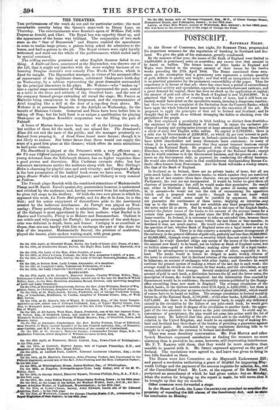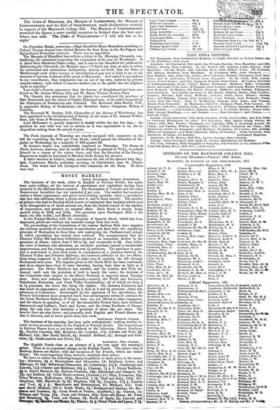POSTSCRIPT.
SATURDAY NIGHT.
iIl the House of Commons, last night, Sir ROBERT Pim propounded his important measure for the regulation of banking in'Scotland and Ire- land. We give the pith of his statement, greatly condensed.
By the measure of last.year, the issues of the Bank of England were limited to 14,000,0001. in promissory notes on securities; any excess over that amount to be based on bullion. The future issues -of other banks in England and Wales were limited to the average amount of their issues for the twelve weeks preceding the 27th April 1844. The House sanctioned those mea- sures on theassumption that a promissory note represents a certain quantity of gold, definite in quality and weight ; and that with an unregulated issue there is no practical guarantee for thepermanent convertibility of the raper. Thus far expenence is in favour of that act: there has since been a period of extraordinary commercial activity and speculation, especially in manufacttuvsand railways, and a great demand for capital; there has been no check on the application ot capital; the amount of gold and silver in the Bank of England is now 15,842,000/. It is admitted that the power of creating new banks of issue, bad it still been un limited, would haveacted on the speculative mania, insuring a dangerous reaction: but there has been no complaint of the limitation from the Country Banks; which have upon the whole behaved most honourably in the execution of the act. He proposed to apply the principles of that act to Ireland and Scotland; and he thought that he could do so without deranging the habits or shocking even the rovjudices of the people. .
He first explained a peculiarity in Irish banking as distinct from...Scottish- the existence of the National Bank of Ireland. It enjoys the exclusive pri- vilege of issuing and paying notes (except at large amounts-and long dates) within a circle of sixty four English miles radius. Its capital is 2,769,060/. ; there is a debt due by Govennnent of' -2,630,000/., on -which .4 per cent interest is paid. There are eight other banks.ef issue in Ireland—joint-stock banks: those banks have -4,000 shareholders and many thousands .more customers; to 'many of whom it is a serious inconvenience that they cannot transact business except through the National Bank. Be proposed, with the willing concurrence of its Directors, to withdraw ad the exclusive 'privileges of the National Bank; except that he would continue to it the Government business, and the present rate of -in- terest on the Government debt, as payment for conducting the official business. He would also abolish the oaths in that establishment distinguishing Roman Ca- tholic office-bearers from Protestants. And the Bank willmake a weekly return, like that of the Bank of England.
In Scotland, as in Ireland, there are no private banks of issue, but all are joint-stock banks: there are nineteen banks; to which number they are restricted by the act of last -session : three have charters, two are incorporated underact of Parliament, the rest are not incorporated. It would be better to.give thermal]. charters of incorporation; but still he mould -make that permissive. Be tumid mot, either in Scotland or Ireland, abolish the power of issuing notes under 91. in amount—he would net run the -risk of encountering the opposition which such a proposal would excite ; though he did not know that the use of the small notes could be justified by argument Be would not . guarantee the continuance of those notes; implying no intention gamy way .as to the future. He would not establish any fixed proportion between the notes under SI. or above. But be would, as in thecase of the English banks, restrict the future issues of the banks to the amount of the average issues for a certain time past—namely, the period since the -27th of April 1844—thirteen lunar months. In Ireland, it is necessary to take an extended time, because there has been a.great increase in the issues within the last three or four mouths; in Scotland-it does .not much matter. Ile would solve the doubt in Scotland as to the question of-law, whether Bank of England notesore a legal tender or not,,by making them mot so. There is .in this,country amecurity agamst-derangement of the curreney,in the general diffusion of gold coin, probably not leas than 30,000,0001. or 66,000,0001., through every part—a security which do not exist in Ireland or Scotland: he -would therefore oblige any excess of the issues of the-banks-(over the ameunt now fixed) to be bas, not.= bullion or Bank of England notes,but on bullion alonegold or silver Indlion; making silver under 21. a legal tender. It would be advantageous to encourage an increase of silver, espw.- ially in Ire- land. The banks would in future be obliged to make weekly returns of the notes in circulation; but in Scotland returns of the-circulation,eachdaymould be fallacious, on account of exchanges with other -banks; and therefore he would continue the present system of making a return of the last day in each -week : the average would be struck on the returns for four weeks, and the circulation' .or any excess, calculated on that average. Several statistical particulars, such as the amount of gold in each bank, a distinction between the bi and the lower notes, the description of issues, &c. would be required: but the information thus exactaby Government would bein confidence; themonthly returns published by the Stamp- office resemblios those -now made in England. The average circulation of the Scotch banks, in the thirteen months since 27th April, is 3,041,0001.; but there is in the November ofeach year an excess in the issues of about 500,0004 which would of course have to be based on bullion. The average circulation in Ireland would in future be, of the National Bank, 3,706,0001.; of the other banks, 2,565,0001.; in all, 6,271,0001. As there is in Scotland no national bank, to supply any deficiency caused in the circulation by the failure of any joint-stock bank, he would give ;permission for any bank to dispose of its circulation to another bank; the aggre- gate of the two amounts to be taken as the joint cirmilation. To avoid any in- convenience of precipitancy, the plan would not come lute action until the 1st of January next. He believed that this plan would.add to the stability of the cir- culation in the United Kin.gdoln and would be an equitable may of making Ire- land and Scotland bear their dui* of the burden of providing a guarantee against commercial panic. He concluded by moving resolutions directieg bills to be brought in to regulate the currency in Ireland and-Scotland.
There was some desultory conversation. Mr. Fox MArrim :and other Scotch Members expressed satisfaction at finding the measure no more alarming than it proved to be; some, however, still deprecating interference. Mr. F, T. Hamm° .told them that they would he more sensitive than sensible to quarrel with it. Mr. SHEIL expressed approval on the part of Ireland. The resolutions were agreed to, and leave was given to,bringin two bills founded on them.
The House went into -Committee on the Maynooth Endowment EDII and passed a resolution authorizing a grant of 30,0001. for improving May- nooth College and the payment of the amount requisite for salaries, 80.1 out of the Consolidated Fund. Mr. Law, at the request of Sir Robert Peel, postponed an.amendment di which he had given notice: but on Monday, -when-the motion for bringing up the report is made, he will move.that it be brought up that day six months.
Other measures were forwarded a stage.
In the House of Lords, the LOS.D OHANCELLOR promised tossonsider the propriety of repealing the 201. dame_ of the Insolvency Aot, and le *tate his conclusion on Monday.
The Duke of Nbaeoner, the Marquis of LaWsnOWthe the Marquis of LonnowDERveend the Earl of SmenwsnunP, madedeolarations warmly in support of the Maynooth College Bill. The Marquis of LONDONDERRY promised the Queen a more cordial reception in 'Ireland than she had any- Where met with. 'The Puke Of WELLiereeroa" I Will tell her so to- night."



























 Previous page
Previous page